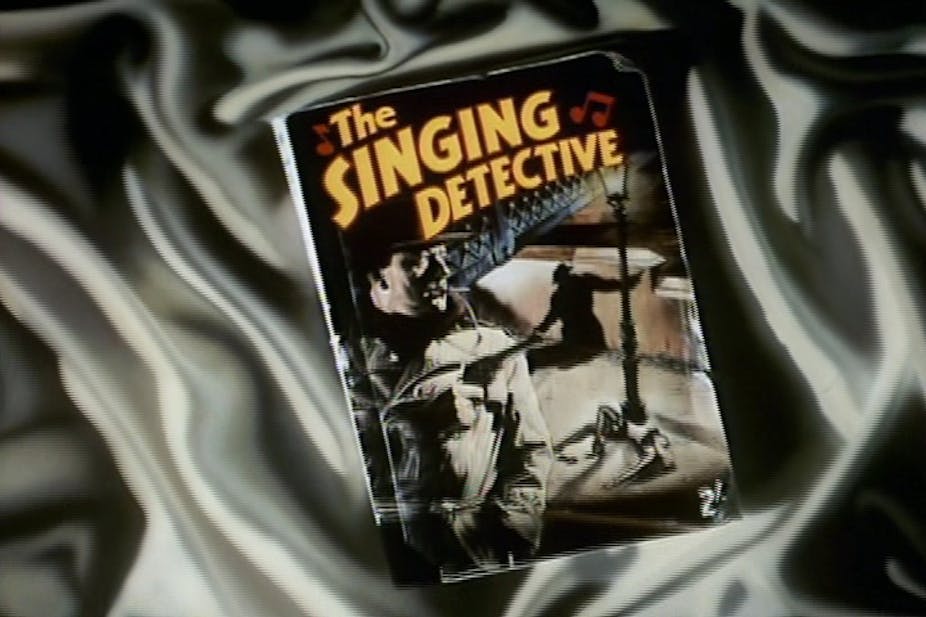Monday, mid-November, 30 years ago, British newspapers were hailing the first episode of a major “television drama event” that had aired the night before. “Every Sunday for Six Weeks: Drama from Heaven,” declared The Financial Times. “Stunning new serial,” wrote The Guardian.
Those of a certain age may be disconcerted to learn it has been three full decades since The Singing Detective, the six-part drama by Dennis Potter, was first shown on British television on Sunday nights at 9pm. It still frequently features in “greatest-ever TV” polls.
Much parodied over the years, many will be familiar with the story even if they haven’t seen it. A middle-aged misanthropic writer of pulp detective stories, the appropriately named Philip E Marlow (played by Michael Gambon), is hospitalised with a dreadful disease that inflames the skin and cripples the joints. Confined to his hospital bed and suffering intermittent bouts of fever, Marlow hallucinates doctors, nurses and other patients miming to the old 1940s dance band tunes from his youth.
In his head, he starts to rewrite one of his own old detective novels, imagining himself as its hero, The Singing Detective, striding down the shadowy mean streets of 1945 post-war London. At the same time, he delves into his own childhood memories from the same year, reliving a sexual trauma that led to his mother’s suicide.
What elevates The Singing Detective is the way in which these threads gradually intersect: individuals from Marlow’s childhood memories appear in his pulp detective fantasy; characters from the detective fantasy emerge in the “real” hospital ward. Reality and imagination finally completely fuse as a gun battle takes place in the ward and the seemingly “real” Marlow is killed off and replaced with his fantasy alter ego, The Singing Detective. The writer character has used his memory and imagination to renew himself psychologically, replacing his old sick self with a more positive and open persona that can leave hospital.
It provides arguably the most vivid representation of the workings of the human mind ever realised on screen. “This is the piece of work I’d like to be remembered for,” Potter told The Times even as the drama was still being shot by its very able director, Jon Amiel. “It goes leagues forward from anything I’ve written.”

Box-set generation
While “quality” US TV dramas such as The Sopranos, Mad Men and Breaking Bad have taken up the baton of narratively complex and layered storytelling, arguably none have quite sustained the intense interior drama and rich metaphor of The Singing Detective. According to one Guardian critic writing in 2012, it makes “the best current drama look like an amateur hour”.
Behind this may lie the different industrial constraints of modern long-form US TV dramas. There is always a commercial incentive to keep them running for more seasons than is artistically desirable, using a soap opera-like “infinitely extended middle” of interweaving storylines and story arcs to resist the audience’s desire for resolution. Contrast this with The Singing Detective, made by the public service BBC in a very different era. The whole drive was towards final narrative closure.
Running for only six episodes allowed it to benefit from the intensity of a single authorial vision. Contemporary US TV dramas extol authorial vision, too, but in the form of the showrunner – the head writer-producer who creates the series and develops the main story arcs. The showrunner leads a team of writers who write individual episodes which are passed to different directors to realise on screen.
The experience of both creating and watching long-form TV drama is therefore very different to the traditional BBC model of one writer and one director.
The best of British
America’s success with long-form drama has meant British TV drama has struggled to keep up in recent years. Potter’s closest British successor is probably Stephen Poliakoff, writer-director behind the likes of Shooting the Past and Perfect Strangers.
Poliakoff is given considerable freedom at the BBC to choose his own subjects and sculpt well-crafted dramas, often exploring forgotten or suppressed aspects of British history. His current drama, Close to the Enemy (BBC Two), is interestingly set in the same immediate post-war time period as The Singing Detective. Yet Poliakoff’s dramas tend to lack the passion that animated Potter’s best works – and do not have the same popular reach.
Nor is there much to recommend recent occupants of the BBC’s Sunday night 9pm drama slot. This autumn has featured season two of Poldark, a ratings hit – but basically safe period fare; and My Mother and Other Strangers, which revolves around GIs arriving in Northern Ireland during World War II. It is “an incredibly hackneyed premise”, according to The Guardian. This is typical of the reviews. Both dramas are in the tradition of escapist feel-good British drama on Sunday nights against which The Singing Detective was bucking the trend even in 1986.

Far more interesting is The Missing, whose second series will shortly end on BBC One. It has gripped viewers on Wednesday nights and won praise for its depiction of detective Julien Baptiste (played by Tchéky Karyo) trying to solve the riddle of two missing schoolgirls in Germany a decade earlier, after one suddenly reappears. Critics have praised the complexity of its storytelling and the narrative’s fluid shifts between past and present.
Here, then, is a legacy of The Singing Detective. Potter’s experiments 30 years ago with interweaving narratives and timelines have become part of the accepted grammar of television drama today. Yet in the case of The Missing, these innovations are principally being used to refresh well-worn TV crime staples – child abduction and serial killers.
This is very different from how Potter escaped fixed genre to play freely with the conventions of the hospital drama, detective story, childhood drama and so on. More than 20 years after Potter’s untimely death at the age of 59, it is hard to find anything on British TV today that is truly the artistic peer of The Singing Detective.

